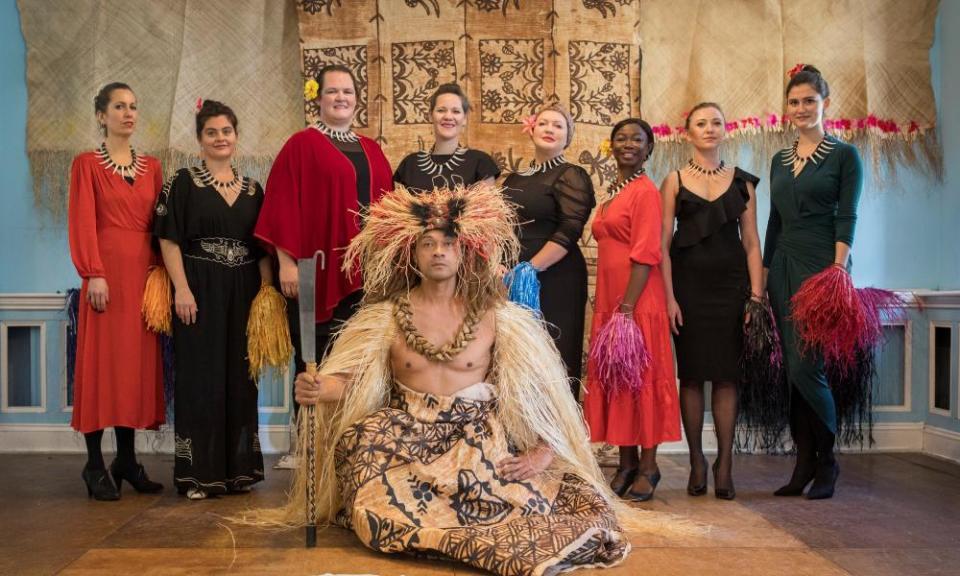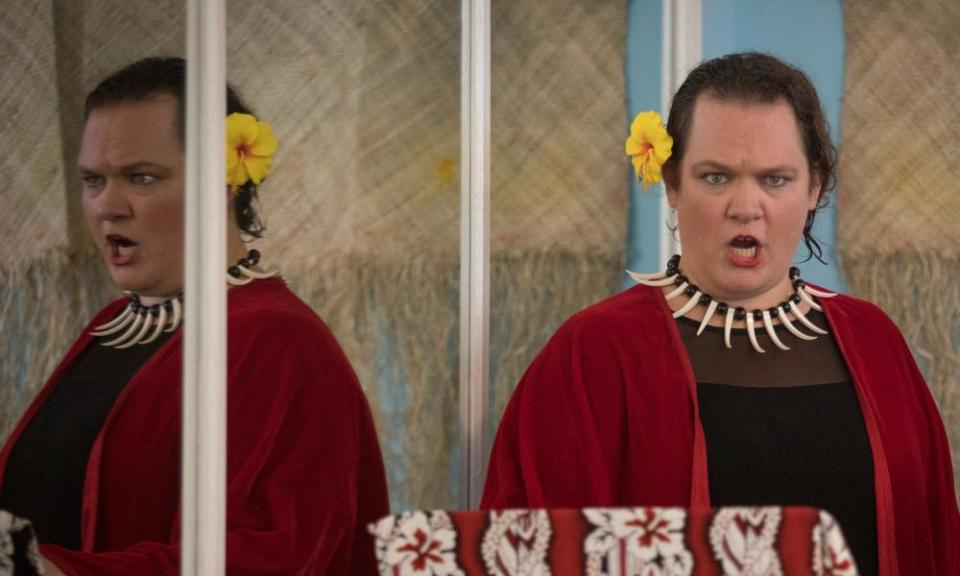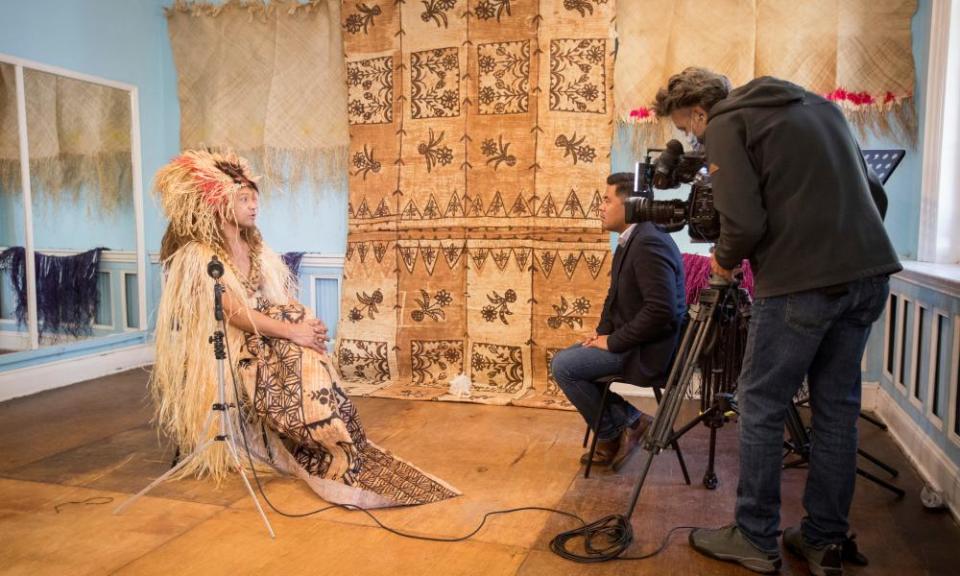‘Feel the fear, then do it’: Wagner’s Ring cycle gets a bold Samoan rework

Here is an insane undertaking: a small London-based arts collective, Gafa, run by singers of Samoan heritage, putting on a complete Ring cycle – four vast operas, almost 15 hours of music – in a church in Putney, southwest London. Opera houses spend years plotting their Ring cycles, adding the parts of the tetralogy incrementally, usually year by year. Gafa (pronounced Nafa and meaning “family” in Samoan), however, are performing all four of Wagner’s herculean works on successive Saturdays. Surely an act of hubris that will invite nemesis, even from gods facing imminent twilight.
Except that Sani Muliaumaseali’i, the co-founder of the collective and driving force behind the project, refuses to see it in those terms. “Everyone says that,” he says during a break in rehearsals when I suggest he is mad to take this on. “But I’ve been thinking about it since 2007. Siegfried was a hit three years ago [the collective put on the Ring cycle’s third opera in 2019], and I thought: ‘If you can do it, then do it. Feel the fear, let it consume you, and then do it.’” “It is a mountain to climb,” says co-founder Aivale Cole, who is singing Freia in the first of the four operas, Das Rheingold. “But Sani loves mountains.”

Muliaumaseali’i, who was born in New Zealand to Samoan parents, is a tenor who studied at the Queensland Conservatorium of Music. His brother Eddie is also a singer; their twin careers reflect the fact that Samoan society is steeped in music, both at home and in church. Sani also writes and produces. As well as being de facto artistic director of RinGafa, as the collective styles its cycle, he will also sing Siegfried. Heroic in every sense – not least as he plays the part in a grass skirt, an indigenous warrior pitted against the colonisers.
RinGafa is being presented as the Ring “in concert with movement”. What that means in reality is that each opera has a Samoan subtext, usually expressed through dance or a specially written scene that draws parallels between Wagner’s great Nordic creation myth, with the gods’ love of power destroying them and Brünnhilde’s self-inflicted immolation ushering in suffering humanity, and the Pacific experience of western settlers usurping indigenous deities and imposing their own faith and values. Throw in a backcloth of the 1918 flu epidemic (prefiguring our present pandemic), brought to the islands by New Zealanders aboard the SS Talune, that killed 22% of Samoans, as well as allusions to climate change that threatens to overwhelm the islands, and you have a potent cocktail.

In his notes on the production, Muliaumaseali’i is explicit about the political subtext: “Once the colonial floodgates opened, an insatiable love of power fuelled the snatching of territories and the promotion of foreign culture and values. The cultural climate changed forever in paradise and, though most colonial powers have now sloped away, the legacy of the western land grab continues today, but now it’s the rising sea that usurps these beleaguered isles, a direct result of western folly.”
In a semi-staged production, however, it is impossible to fully work through those ideas, so what we have is the complete text of the Ring cycle – this is not an adaptation but a presentation of the entire work – with Samoan-inspired interpolations. Rheingold begins with a monologue explaining the coming of Christianity to Samoa and the banishing of the indigenous gods; in Die Walküre, the Valkyries are burying not slain heroes of the battlefield but young women in a convent who have succumbed to the killer flu. There is a traditional Samoan fire dance in Siegfried, and Götterdämmerung is awash with the tourist kitsch that characterises present-day Samoa. In a nice touch, whereas at Bayreuth the audience is summoned by a brass fanfare from the Ring, here each opera starts with a blast on a conch shell.
Don’t these Samoan-inflected additions make an already gargantuan work impossibly long, I ask production coordinator Faautu Talapusi? “What’s another 20 minutes?” she says blithely. A fair point when audiences are already giving up six hours on a Saturday evening for Die Walküre, Siegfried and Götterdämmerung (the prologue, Das Rheingold, is happily shorter).
Talapusi explains Gafa’s rationale: “We are asking what does it mean to be a creative in London but rooted in Samoa? What does it mean to be a Samoan in the diaspora? People say ‘What’s the connection [with Wagner’s Ring cycle]’, but there is a connection. Our gods lost their power just as the Nordic gods did.”
The question is what replaced them, and the answer seems to be an uprooted people and a tacky tourist paradise that is far from paradisiacal, and may, through excessive air travel and general overconsumption, threaten the land itself. Muliaumaseali’i hopes in the future – perhaps even as early as next year – to put on a full production that will give these ideas full dramaturgical force.

Conductor Stephen Anthony Brown, founder of the Rosenau Sinfonia, is the man who has to make all this work musically. How does he find grafting a Samoan subtext on to Wagner’s masterwork? “I’m always doubtful about how it’s going to work to start with,” he says, “but any doubts I have get assuaged as soon as an audience is there and they get drawn in. It’s Sani’s vision and so far he hasn’t let me down.” Brown was music director on the Gafa production of Siegfried and has also worked with Muliaumaseali’i on Handel’s Messiah and the Verdi Requiem.
In any case, for musicians to work on the Ring is too good an opportunity to miss. “My second clarinettist said ‘I’ll bite off Fasolt’s arm to do it’,” says Brown. “We’re all going to earn our place in Valhalla.” It is also a rare opportunity for the principal singers. Some of them have sung the parts before, but others have only had the chance to understudy them. Latvian-born Pauls Putnins, who is singing Wotan in Rheingold and Walküre, understudied the role at Longborough festival opera but makes his debut here. “It’s a blessing for any singer to tackle a role like this,” he says. “It’s so rich that it’s a never-ending process.”
Doing the whole Ring with a full orchestra does not come cheap. Muliaumaseali’i is coy about the cost, but it is well into six figures, with funding principally from long-term backers Clearpoint, a consultancy firm based in London and New Zealand which describes itself as “passionate about promoting the unheard voices of the Pacific region”.
Brown believes that for audiences, the intimacy of the setting will be overwhelming. “To be that close to Wagner makes it a unique experience,” he says. “The audience will feel as if they are on stage,” adds Aivale Cole. It will also bring a touch of Samoan life to a small parish church by the Thames. “Sani always brings the Pacific into our work,” she says. “Wagner lovers will have a good night of it, but they should come with an open mind to expect something a little bit different.”
• RinGafa is at St Mary’s Church, London, on successive Saturdays from 30 October.

 Yahoo Finance
Yahoo Finance 